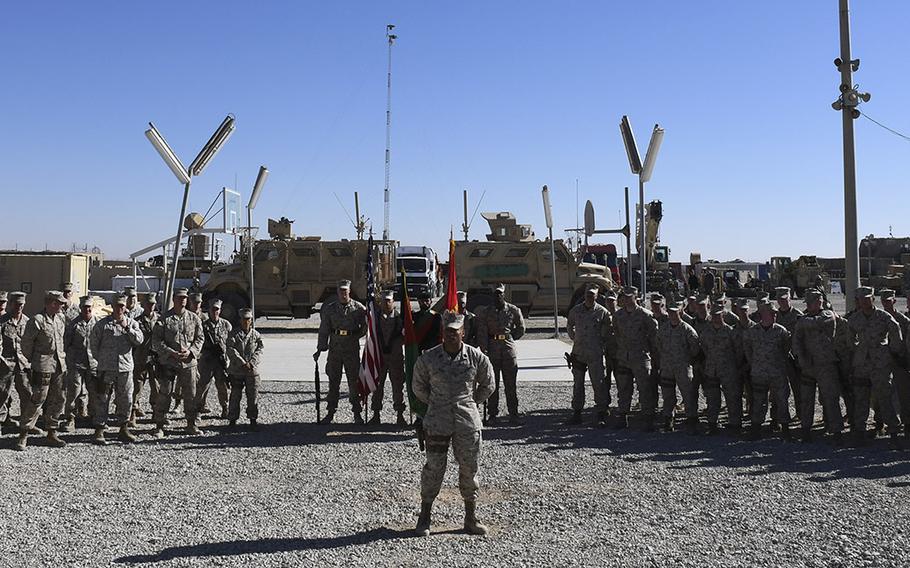
Marines from Task Force Southwest wait at parade rest for the start of a transfer of authority ceremony at Camp Shorab in Helmand province, Afghanistan, on Monday, Jan. 15, 2018. About 300 Marines from the task force's first rotation, represented by the platoon on the left, were relieved by a similarly-sized unit represented by the platoon on the right. (Chad Garland/Stars and Stripes)
CAMP SHORAB, Afghanistan — A new batch of Marines has taken over an effort to build up Afghan security forces in restive Helmand province, a Taliban stronghold at the heart of the country’s opium trade.
Brig. Gen. Roger B. Turner Jr., commander of first rotation of Task Force Southwest, transferred authority to Brig. Gen. Benjamin Watson in a ceremony Monday at this base formerly known as Camp Leatherneck and Camp Bastion.
The Marine task force was the main effort of NATO’s Resolute Support mission last year, and will continue to be so in 2018, said Gen. John Nicholson, the top U.S. commander in Afghanistan, at a ceremony in which Turner passed the guidon to Watson.
“As we speak, [Afghan security forces] are conducting offensive operations in 13 of Afghanistan’s 34 provinces, and it started right here in Helmand,” Nicholson said. “The Taliban, and especially their senior leadership, are seriously questioning their future here in Helmand.”
The province has been the site of some of the heaviest fighting, where many Marines gave their lives in the 16-year war. But after combat operations ended in 2014, security in the province faltered and the provincial capital, Lashkar Gah, was on the verge of falling to the insurgents in 2016.
The local army corps was disintegrating under poor leadership and corruption, so NATO scrambled an ad hoc Army advisory group to help shore up government forces and rebuff the Taliban advance. Last spring, the Army handed that mission over to the Marines, the largest contingent the Corps had deployed to the country since the end of combat operations.
Since then, the task force of about 300 Marines has advised the army’s 215th corps and the national police’s 505th zone, supporting nine offensive operations throughout the province, helping wrest back key territory and bolstering security around the capital.
When the Marines first returned to the province, they were able to rekindle some old relationships, Turner said, and quickly built new ones that helped them get up to speed.
“We put the gas pedal on the floor back last April and left it there,“ Turner said.
Among the task force’s successes, officials said, was the development of an offensive mindset among the Afghan forces.
Minutes after the ceremony, advisers from the outgoing group were already back at work helping their partners target enemy forces.
This summer, backed by Marines, local troops retook the Nawa district center, the site of a vital airfield near the provincial capital. Local forces also carried out offensives in Sangin, Nad’Ali, Nahr-e Saraj and Garmsir, showing increasing confidence and competence, the Marines said.
The security forces “stole the initiative from the enemy,” Turner said. “They stole the initiative and they never relinquished it."
In an operation that just ended Saturday, government forces recaptured Marjah, a key district where thousands of Marines, international forces and Afghans had ousted the Taliban eight years ago in one of the largest operations of the war — one officials were confident then would mark a turning point.
But as the war grinds on, a resurgent Taliban controls or influences an estimated 13 percent of the country’s 407 districts, more territory than it has since its regime was toppled in 2001. Late last year, the U.S. and Afghanistan launched an aggressive new campaign targeting the group’s drug revenues in Helmand with airstrikes and special operations forces raids.
The Marines have also been operating the M142 High Mobility Artillery Rocket System, or HIMARS, in support of the campaign.
Together with the Marine-supported offensives, the combined effects have taken a toll on the Taliban, who Turner said are unable to mount coordinated operations to achieve their objectives and have suffered “massive attrition.”
As the Marines have helped their counterparts take a more aggressive stance, the Afghans have seen a 40 percent reduction in casualties, Nicholson said. Casualty evacuation training has also reduced the time it takes to ferry wounded troops from the battlefield.
The Marines also helped their partners introduce an operational readiness cycle that has provided relief to beleaguered units and allowed them a chance to regroup and hone their skills.
Air controllers trained by the Marines have shown recent competence in calling for precision airstrikes from MD-530 helicopters and A-29 light attack planes in support of maneuvering ground elements.
While the first rotation trained and advised security forces at the brigade and kandak (battalion) level in some cases, the second rotation is expected to do even more to support such tactical units.
The Trump administration’s strategy calls for putting more U.S. advisers with frontline units. Nicholson expects to have those troops in place this spring with the deployment of the Army’s 1st Security Forces Assistance Brigade.
As part of that plan, the new Marine rotation brings more troops to advise the lower level units — but still less than 400 — and brings more capabilities, though Watson, the unit’s commander, declined to discuss what those capabilities include, but he said his team is “purpose-built” and looking forward to the challenge.
Watson, who served in Helmand during the height of U.S. involvement in the war, said he is focused on building on the work Turner and his Marines had started.
“My team and I, we’re honored to be here,” he said. “We’re sobered by the responsibility with which we’ve been entrusted, but we’re excited by the opportunity to make a difference.”
garland.chad@stripes.com Twitter: @chadgarland